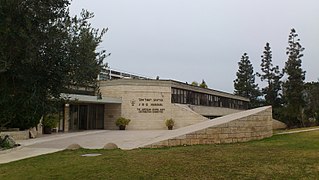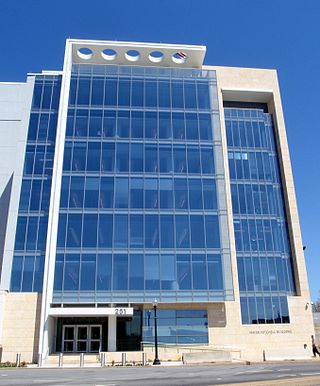The Ford Foundation is an American private foundation with the stated goal of advancing human welfare. Created in 1936 by Edsel Ford and his father Henry Ford, it was originally funded by a US$25,000 gift from Edsel Ford. By 1947, after the death of the two founders, the foundation owned 90% of the non-voting shares of the Ford Motor Company. Between 1955 and 1974, the foundation sold its Ford Motor Company holdings and now plays no role in the automobile company.
The American Israel Public Affairs Committee is a lobbying group that advocates pro-Israel policies to the legislative and executive branches of the United States. One of several pro-Israel lobbying organizations in the United States, AIPAC states that it has over 100,000 members, 17 regional offices, and "a vast pool of donors". In addition, the organization has been called one of the most powerful lobbying groups in the United States.
Open Society Foundations (OSF), formerly the Open Society Institute, is a US-based grantmaking network founded by business magnate George Soros. Open Society Foundations financially supports civil society groups around the world, with the stated aim of advancing justice, education, public health and independent media. The group's name was inspired by Karl Popper's 1945 book The Open Society and Its Enemies.
The Koch family foundations are a group of charitable foundations in the United States associated with the family of Fred C. Koch. The most prominent of these are the Charles Koch Foundation and the David H. Koch Charitable Foundation, created by Charles Koch and David Koch, two sons of Fred C. Koch who own the majority of Koch Industries, an oil, gas, paper, and chemical conglomerate which is the US's second-largest privately held company. Charles' and David's foundations have provided millions of dollars to a variety of organizations, including libertarian and conservative think tanks. Areas of funding include think tanks, political advocacy, climate change denial, higher education scholarships, cancer research, arts, and science.
Revlon, Inc. is an American multinational company dealing in cosmetics, skin care, perfume, and personal care. The headquarters of Revlon was established in New York City on March 1, 1932, where it remains. Revlon was founded by brothers Charles and Joseph Revson, and chemist Charles Lachman. Revlon products are sold in 150 countries and the company has many global locations including Mexico City, London, Paris, Hong Kong, Indonesia, Sydney, Singapore, and Tokyo.

American Jewish Joint Distribution Committee, also known as Joint or JDC, is a Jewish relief organization based in New York City. Since 1914 the organisation has supported Jewish people living in Israel and throughout the world. The organization is active in more than 70 countries.
The American Jewish Committee (AJC) is a Jewish advocacy group established on November 11, 1906. It is one of the oldest Jewish advocacy organizations and, according to The New York Times, is "widely regarded as the dean of American Jewish organizations". As of 2009, AJC envisions itself as the "Global Center for Jewish and Israel Advocacy".
Shara'a Simsim is a Palestinian educational television program for preschoolers based on the popular U.S. children's show Sesame Street. The series began airing in 1998 as a joint program with the Israeli version of Sesame Street, Rechov Sumsum, as a way to promote coexistence between Israeli-Jews and Israeli-Arabs.

The American Jewish Congress (AJCongress) is an association of American Jews organized to defend Jewish interests at home and abroad through public policy advocacy, using diplomacy, legislation, and the courts.
Charles Haskell Revson was an American businessman and philanthropist. He was best known as a pioneering figure in the American cosmetics industry as the person who created the first pigment-based nail polish and founded and managed Revlon through five decades.
The Foundation for Jewish Culture was an advocacy group for Jewish cultural life and creativity in the United States.

The Israel lobby are individuals and groups seeking to influence the United States government to better serve Israel's interests. The largest pro-Israel lobbying group is Christians United for Israel with over seven million members. The American Israel Public Affairs Committee (AIPAC) is a leading organization within the lobby, speaking on behalf of a coalition of pro-Israel American Jewish groups.

The Wexner Foundation is a philanthropic organisation which focuses on developing Jewish professional and volunteer leaders in North America and public leaders in Israel. Founded by Les Wexner, CEO of Limited Brands, and his wife, Abigail Wexner, in 1983, its headquarters are located in New Albany, Ohio, with additional offices in New York City and Jerusalem. In addition to their offered leadership programs, the Wexner Foundation supports other Jewish charities as well.

Shurat HaDin is an Israeli non-governmental organization (NGO) founded in Tel Aviv in 2003. Shurat HaDin has been described by some as a civil rights organization and others as a pro-Israel lawfare-waging NGO.
The Koret Foundation is a private foundation based in San Francisco, California. Its mission is to strengthen the Bay Area and support the Jewish community in the U.S. and Israel through grantmaking to organizations involved with education, arts and culture, the Jewish community, and the Bay Area community. The foundation takes an approach of testing new ideas and bringing people and organizations together to help solve societal and systemic problems of common concern.
Shoshana is a Hebrew feminine first name. It is the name of at least two women in the Bible and, via Σουσάννα, it developed into such European and Christian names as Susanna, Susan, Susanne, Susana, Susannah, Suzanne, Susie, Suzie, Sanna and Zuzana. In Ethiopia it became Sosie, Sosina, Sosena, while in North Africa it yielded Sawsen and Sawsan.
Lynn Schusterman is an American billionaire philanthropist. She is the co-founder and chair emerita of the Charles and Lynn Schusterman Family Philanthropies, and founder of several other philanthropic initiatives.

The David Bohnett Foundation is a private foundation that gives grants to organizations that focus on its core giving areas – primarily Los Angeles area programs and LGBT rights in the United States, as well as leadership initiatives and voter education, gun violence prevention, and animal language research. As of 2022, the foundation has donated $125 million to nonprofit organizations and initiatives.
Rechov Sumsum is the Israeli adaptation of the U.S. children's show of the same name.

The New Israel Fund (NIF) is a United States-based non-profit NGO established in 1979. It describes its objective as social justice and equality for all Israelis. The New Israel Fund says it has provided $300 million to over 900 Israeli civil society organizations that it describes as "cutting-edge." It describes itself as active on the issues of civil and human rights, women's rights, religious status, human rights for Palestinians in the Israeli-occupied territories, the rights of Israel's Arab minority, and freedom of speech. The New Israel Fund is the largest foreign donor to progressive causes in Israel.






